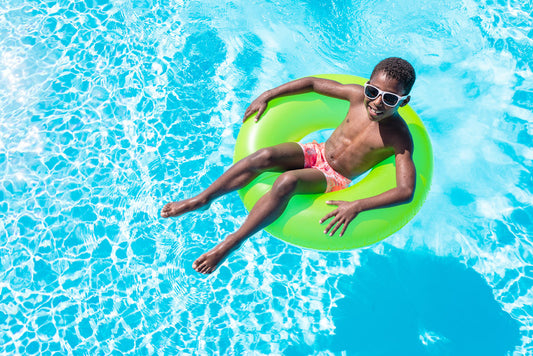Can you open your pool with last year's pool chemicals?
SKIMMER NOTES: As a general rule, most pool chemicals, including pool shock and balancers, should be used within two pool seasons. BUT if you use chlorine and bromine oxidizers and sanitizers, it’s best to use them within one season. How you store the chemicals can also impact their longevity, so always store them in a cool, dry, secure and well-ventilated area.

Need more help?
Call us
Prefer to call us?
We've got someone standing by daily from 9 a.m. – 7 p.m. ET, Monday – Friday
(866)-HTH-POOL- Category:
- Pool •
- Pool Opening •
It’s pool opening season, so if you're like many pool owners, you’ll mosey into the garage, peruse the shelves for any leftover pool shock and some balancers, and then Google whether it’s safe to use last year’s pool chemicals for this year’s pool water. (Are we right? Eerie, isn’t it…)
So here, we'll talk about pool chemical storage and effectiveness so you know exactly what’s safe, and what will work to clear up that winter-green pool for swim season.
How long can you store pool chemicals before they go “bad”?
And by “bad,” we really mean “less effective.” The type of pool chemical in combination with how you stored it will determine how long it lasts. As a general rule, most pool chemicals, including pool shock and balancers, should be used within two pool seasons. BUT if you use chlorine and bromine oxidizers and sanitizers, it’s best to use them within one season – during the season you buy them – especially when it comes to liquid chlorine or calcium hypochlorite (also known as cal-hypo).
Where should I store pool chemicals? Can I put them outside or in the garage?
The perfect spot for storing pool chemicals is a cool, dry, secure, and well-ventilated area. Why is ventilation important? For safety. Prevent exposure to any toxins by storing your pool chemicals in an area with good ventilation to avoid any toxic vapors, fumes, mists or airborne dust that could float around. So, that idea to store pool chemicals in the garage? Not the best idea. Storing pool chemicals in your garage is not a good idea unless they are in some sort of locked storage bin or cabinet. One more thing: Many chemicals, especially oxidizers and strong acids, can corrode some metals, and cause rust or other damage. And on that note, never store oxidizers and organic chemicals like gasoline in poorly ventilated or frequently used areas.
Whatever you do, don’t do THIS.
Storing your pool chemicals wrong? You're not alone. Not keeping your pool chemicals cool and dry is probably the most important and most common mistake of pool owners. Getting oxidizers wet can be dangerous. Not to mention, if you let liquid chemicals freeze, they become unusable and ineffective (even when thawed).
Can I use expired pool chemicals? Do expired pool chemicals still work?
Unless a particular chemical has separated, become noticeably discolored, or if it has developed a bad odor, the product will likely still work – it just won't work as effectively as when it’s fresh and new.
So, MAYBE garage in a cabinet. But what about outside – can I leave my pool chemicals outside?
Many pool chemicals don't have a good reaction to extreme temperatures – including extreme heat or extreme cold – which is obviously a risk when you store pool chemicals outdoors. If you store your pool chemicals in an environment that’s warmer than 95 degrees Fahrenheit, liquids can expand and/or gases can be released that can cause the container to leak or spill. In some cases, it can cause dangerous conditions that could lead to fire or an explosion. If liquid chemicals are allowed to freeze, they could begin to separate and lose effectiveness or become unusable.
As always, we’re here to help. If you have questions, contact our help line at 1-866-HTH-POOL or talk to our experts with our live chat!
Caution
Please read the following important reminders before adding pool chemicals to water:
• NEVER mix products together or dissolve before use.
• ONLY enter pool when FAC levels are below 4 ppm to prevent risk of bodily harm.


